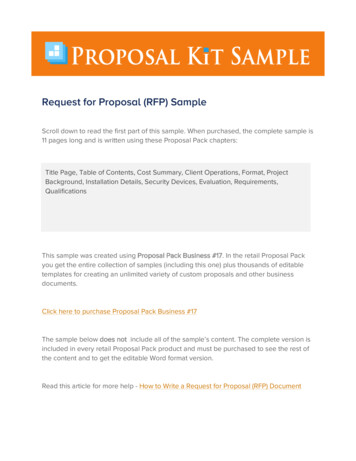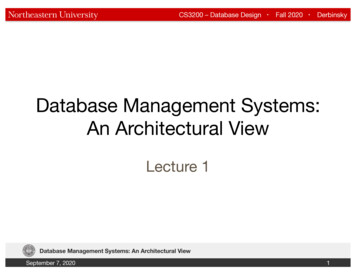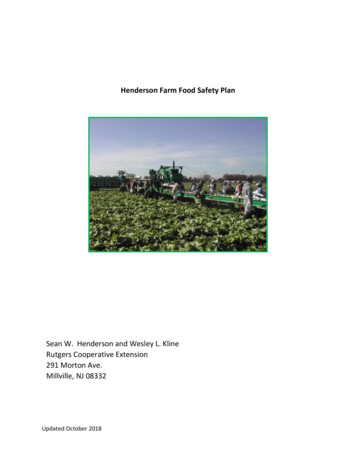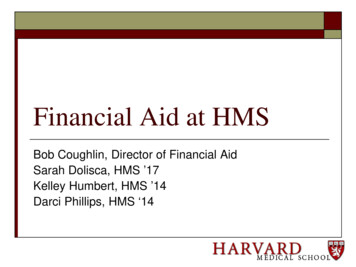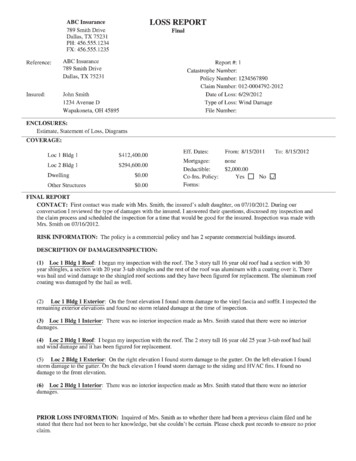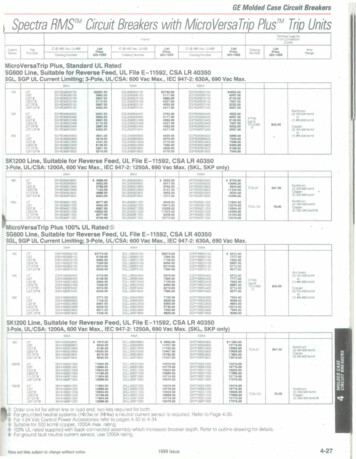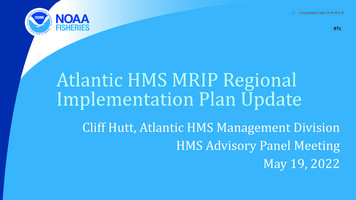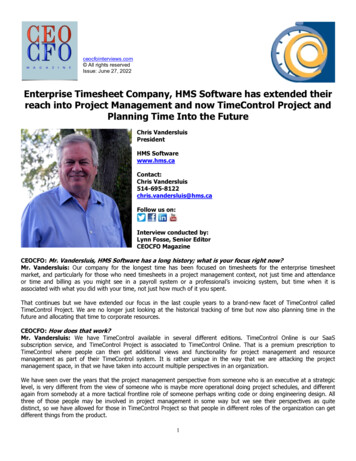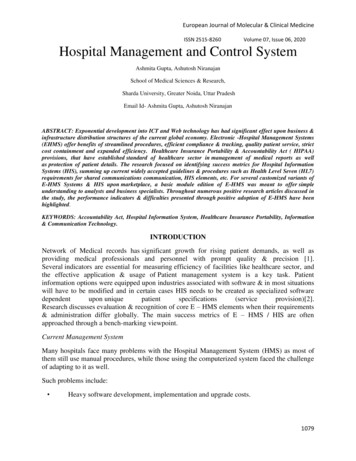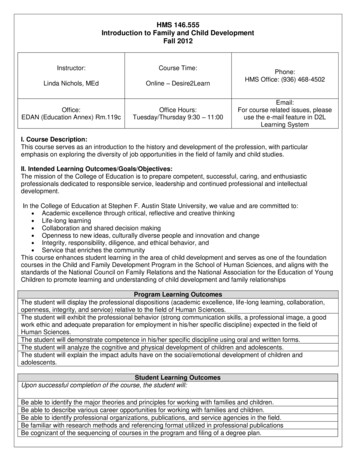
Transcription
HMS 146.555Introduction to Family and Child DevelopmentFall 2012Instructor:Course Time:Linda Nichols, MEdOnline – Desire2LearnOffice:EDAN (Education Annex) Rm.119cOffice Hours:Tuesday/Thursday 9:30 – 11:00Phone:HMS Office: (936) 468-4502Email:For course related issues, pleaseuse the e-mail feature in D2LLearning SystemI. Course Description:This course serves as an introduction to the history and development of the profession, with particularemphasis on exploring the diversity of job opportunities in the field of family and child studies.II. Intended Learning Outcomes/Goals/Objectives:The mission of the College of Education is to prepare competent, successful, caring, and enthusiasticprofessionals dedicated to responsible service, leadership and continued professional and intellectualdevelopment.In the College of Education at Stephen F. Austin State University, we value and are committed to:Academic excellence through critical, reflective and creative thinkingLife-long learningCollaboration and shared decision makingOpenness to new ideas, culturally diverse people and innovation and changeIntegrity, responsibility, diligence, and ethical behavior, andService that enriches the communityThis course enhances student learning in the area of child development and serves as one of the foundationcourses in the Child and Family Development Program in the School of Human Sciences, and aligns with thestandards of the National Council on Family Relations and the National Association for the Education of YoungChildren to promote learning and understanding of child development and family relationshipsProgram Learning OutcomesThe student will display the professional dispositions (academic excellence, life-long learning, collaboration,openness, integrity, and service) relative to the field of Human Sciences.The student will exhibit the professional behavior (strong communication skills, a professional image, a goodwork ethic and adequate preparation for employment in his/her specific discipline) expected in the field ofHuman Sciences.The student will demonstrate competence in his/her specific discipline using oral and written forms.The student will analyze the cognitive and physical development of children and adolescents.The student will explain the impact adults have on the social/emotional development of children andadolescents.Student Learning OutcomesUpon successful completion of the course, the student will:Be able to identify the major theories and principles for working with families and children.Be able to describe various career opportunities for working with families and children.Be able to identify professional organizations, publications, and service agencies in the field.Be familiar with research methods and referencing format utilized in professional publicationsBe cognizant of the sequencing of courses in the program and filing of a degree plan.
HMS 146.501Linda Nichols Fall 2012Pa ge 2Family Life Educator CertificationFamily Life Content Area I: Families and individualsin societal contexts - an understanding of families andtheir relationships to other institutions, such as theeducational, governmental, religious, andoccupational institutions in society.Family Life Content Area VIII: Family, law, andpublic policy - an understanding of the legal definitionof the family and laws which affect the status of theCourse content in HMS 146 emphasizes the following family.four of the ten Family Life Content Areas identified byFamily Life Content Area IX: Professional ethics andthe National Council of Family Relations (NCFR).practice - an understanding of the character andquality of human social conduct, and the ability tocritically examine ethical questions and issues.Family Life Content Area X: Family life education an understanding of the general philosophy and broadprinciples of family life education in conjunction withthe ability to plan, implement, and evaluate sucheducational programs.The notes from this class should be retained to use for review purposes for the CFLE exam.III. Course Assignments, Activities, Instructional Strategies, use of Technology:Course Assignments/ Activities: In-class/out-of-class assignments and quizzes (may be announced orunannounced), project/presentation, journal article summary, and family letter.Instructional strategies may include: lectures, class discussion, group participation, guest speakers, andvideos.Use of Technology may include: Desire2Learn learning management system internetassignments/activities/research, and word processing.1. HMS 146 is an online course that utilizes the Blackboard Learning Management System. Informationnotices will be transmitted through the course via e-mail, announcements, and/or home page postings.Access to the various course components (learning modules, discussions, grades, assignments, e-mail,etc.) is though the menu on the left side of the screen within Blackboard. Students are stronglyencouraged to contact the instructor and/or other students via the homepage mail icon, chats, and/ordiscussion postings.2. Course content is delivered via class lectures and discussions, assigned readings, assignments, anddiscussion board questions directly relevant to the course content. Students should check thehomepage on a daily basis for notices, mail, and assignments. Neglecting to check the homepageis NOT a valid excuse for missing an assignment due date.3. Students should check their grade points at least once a week. Any discrepancies in points must beresolved within one week after assignment grades have been posted otherwise the posted gradepoints are considered final and will not be reviewed at a later date.IV. Evaluation and Assessments (Grading):The course is graded on a letter grade basis (A-F). Final grade will be determined by a percentage of totalrequired points for the course. (Total of 525 points)
HMS 146.501Linda Nichols Fall 2012Pa ge 3A 90-100% of required points; B 80-89%; C 70-79%; D 60-69%; F 0-59%.(Final points may vary slightly due to pop quizzes and/or in class participation).Course Points are earned through:1. Scores on Quizzes. There will be 4 end-of-module quizzes during the semester, all of which will beadministered via MyCourses. Each will be worth 50 points. Additionally, there is a syllabus quiz, worth10 points, that must be completed the first week of class. Students must contact the instructor prior tothe exam date if rescheduling is necessary for a compelling reason. All exams must be made up within4 class days or a grade of zero will be recorded.A. Exams include: (total of 210 points)1. Syllabus Quiz10 points2. Module 1 Quiz50 points3. Module 2 Quiz50 points4. Module 3 Quiz50 points5. Module 4 Quiz50 points2. Discussion board points. Students must post discussion question responses directly to thediscussion board by due date/time for credit. Do not e-mail discussion board responses to theinstructor. No credit will be given for e-mail responses. Responses must be informative and answer allparts of the discussion to earn full credit. Additionally, students are expected to participate actively inthe discussion of course content with their class members. Participation is considered “active” asstudents interact with one another through multiple postings in each discussion. Those who post onlyonce within a discussion board and neglect to interact with their classmates will not receive the fullpoints.A. Discussions include: (total of 70 points)1. Career Discussion10 points2. Freire Discussion10 points3. FLE Methodology Discussion10 points4. Ethics Discussion10 points5. Contextual Discussion10 points6. Humanistic Discussion10 points7. Developmental Analysis Discussion10 points3. Assignments. Assignments (including quizzes and discussions) cannot be made up if missed due toan absence, unless prearrangements have been made with the instructor. Students must submit allassignments in the designated location (assignment tab, discussion board, assessments tab, etc).Students are responsible for all course assignments and notices posted on the course home page, andall messages sent to students via email.A. Class Assignments include: (total of 190 points)1. Children and Families in the News25 pointsStudents will locate news articles concerning children and/or families and identifyprofessionals’ impact in each situation.2. Career Investigation25 pointsStudents will investigate the path for two careers in the field.3. Journal Exploration Activity25 pointsStudents will locate a research article, identify the research methods utilized, andprovide an abstract in APA format.4. Ethics Analysis25 pointsStudents will evaluate the CFLE Code of Ethics and apply it to real life situations.5. APA Practice25 pointsStudents will generate a list of references into APA format.
HMS 146.501Linda Nichols Fall 2012Pa ge 46. Evaluation of Journal Activity25 pointsStudents will locate and evaluate journals to determine the category of publication.7. Dialogue with Mrs. Nichols (2)20 points each (40 points)Students will engage in a discussion about course content directly with the professor.B. Assignment format: All posted assignments must be typed in 12 point, Times New Roman fontand submitted online. Handwritten and/or hard copy assignments are non-acceptable. Havingproblems with the computer and/or scanner or failing to view the assignment are unacceptablereasons for failing to complete an assignment by the due date. Do not request to turn in anassignment late for any of these reasons. It is strongly advised that students begin allassignments with sufficient time to allow for technology problems.4. Professional development. A key objective of the university is to prepare students for the professionalworld. A primary method for connecting students with their profession is by encouraging membershipand active participation in the professional organizations central to the field of family studies. Thus, 55points of professional development in this course will be earned by any combination of the followingactivities: (total of 55 points)POINTS2020201510510510ACTIVITYCurrent membership in a National/State organization (e.g. AAFCS/NCFR)Participation in National ConferenceParticipation in State Conference/Meeting (e.g. TCFR/TAFCS, etc)Serve in an officer position in a professional organization (e.g. TCFR, NCFR, TAFCS,AAFCS)Membership in local student chapter (e.g. JCFR/AAFCS)Participation in professional organization sponsored activities or service projectsParticipation in professional organization’s sponsored development and training (e.g. CEU)Participation in regular Student Organization meetings (e.g. JCFR, AAFCS)Honors Recognition from NCFR (only applicable to seniors in their last semester)Use the form found under the Assignments tab in MyCourses to track your Professional Developmentactivities. An example is provided at the end of the syllabus. Prior approval is required for activities notclearly falling within the above identified organizations.Please Note: The National Council on Family Relations (NCFR) Conference is November 3 – 6 inMinneapolis, MN. JCFR is planning to go as a group. If you are interested, please make plans to attend theJCFR meeting in February to sign up and contact the JCFR officers on Facebook to begin travelarrangements. Registration as a student worker will enable one to receive a reduction in the registrationfee, as will NCFR membership. Although the conference does not occur until November, students whoregister before the deadline for this assignment will be able to count the conference on this assignment.5. Extra-Credit Options. Opportunities to earn extra-credit may be given during the semester. Theseassignments may not be announced ahead of time and cannot be made up if missed.
HMS 146.501Linda Nichols Fall 2012Pa ge 5V. Tentative ScheduleTOPICWeek 1-2Module 1 - Welcome to the field of Child and FamilyDevelopmentWeek 3-4Module 2 - Family Life Education OverviewWeek 5-6Module 3 - Research in the field of Child and FamilyDevelopmentWeek 7-8Module 4 - Overview of Major Theoretical FrameworksSee Course Calendar in the “Getting Started” folder on the homepage forspecific dates.VI. Readings (required)There is no textbook required for the course.Various professional journals and publications available in the SFA Library and/or internetVII. Course EvaluationsNear the conclusion of each semester, students in the College of Education electronically evaluate coursestaken within the COE. Evaluation data is used for a variety of important purposes such as course and programimprovement, planning, and accreditation, and instruction evaluation purposes. As you evaluate this course,please be thoughtful, thorough, and accurate in completing the evaluation. Please know that the COE faculty iscommitted to excellence in teaching and continued improvement. Therefore, your response is critical! Fiveextra-credit points will be awarded for each student who completes the online course evaluation by thespecified date.In the College of Education, the course evaluation process has been simplified and is completed electronicallythrough MySFA. Although the instructor will be able to view the names of students who complete thesurvey all ratings and comments are confidential and anonymous and will not be available to theinstructor until after final grades are posted.VIII. Student Ethics and Other Policy InformationAttendance:Class attendance – especially in an on-line course - is vital to success in this course and is expected fromall students. The instructor should be notified immediately if an extended illness occurs. Documentation ofan extended illness is mandatory. Any student having a PLANNED ABSENCE for an SFA universityfunction MUST NOTIFY the professor IN WRITING prior to the absence. This note should be accompaniedby an official, signed SFA memo stating the necessity of the absence. Notes may be verified on the web
HMS 146.501Linda Nichols Fall 2012Pa ge 6page for the Registrar's Office that documents the absence of students for University related functions. It isthe responsibility of the student to make arrangements for missed time BEFORE the absence occurs.Class participation:Class participation promotes a valuable learning environment, and is therefore encouraged and expected.Participation includes asking questions (for clarification or better understanding), discussing current orcontroversial issues related to course content, exploring applications of ideas or concepts, problem solving,and other exchanges of ideas. It is the student's responsibility to read the material assigned in the classschedule prior to assigned interactions to be able to participate effectively in class discussions and/oractivities.Students with Disabilities:To obtain disability related accommodations and/or auxiliary aids, students with disabilities must contactthe Office of Disability Services (ODS), Human Services Building, Room 325, (936) 468-3004/ (936) 4681004 (TDD) as early as possible in the semester. Once verified, ODS will notify the course instructor andoutline the accommodation and/or auxiliary aids to be provided.Academic Integrity:Academic integrity is a responsibility of all university faculty and students. Faculty members promoteacademic integrity in multiple ways including instruction on the components of academic honesty, as wellas abiding by university policy on penalties for cheating and plagiarism.Withheld Grades Semester Grades Policy (A-54):Ordinarily, at the discretion of the instructor of record and with the approval of the academic chair/director,a grade of WH will be assigned only if the student cannot complete the course work because ofunavoidable circumstances. Students must complete the work within one calendar year from the end ofthe semester in which they receive a WH, or the grade automatically becomes and F. If students registerfor the same course in future terms the WH will automatically become an F and will be counted as arepeated course for the purpose of computing the grade point average.Acceptable Student Behavior:Classroom behavior should not interfere with the instructor’s ability to conduct the class or the ability ofother students to learn from the instructional program (see the Student Conduct Code, policy D-34.1).Unacceptable or disruptive behavior will not be tolerated. Students who disrupt the learning environmentmay be asked to leave class and may be subject to judicial, academic or other penalties. This prohibitionapplies to all instructional forums, including electronic, classroom, labs, discussion groups, field trips, etc.The instructor shall have full discretion over what behavior is appropriate/inappropriate in the classroom.Students who do not attend class regularly or who perform poorly on class projects/exams may be referredto the Early Alert Program. This program provides students with recommendations for resources or otherassistance that is available to help SFA students succeed.Definition of Academic DishonestyAcademic dishonesty includes both cheating and plagiarism. Cheating includes but is not limited to (1)using or attempting to use unauthorized materials to aid in achieving a better grade on a component of aclass; (2) the falsification or invention of any information, including citations, on an assigned exercise;and/or (3) helping or attempting to help another in an act of cheating or plagiarism. Plagiarism ispresenting the words or ideas of another person as if they were your own. Examples of plagiarism are (1)submitting an assignment as if it were one’s own work that has been purchased or otherwise obtained froman Internet source or another source; and (2) incorporating the words or ideas of an author into one’s paperwithout giving the author due credit. Please read the complete policy athttp://www.sfasu.edu/policies/academic integrity.asp
HMS 146.501Linda Nichols Fall 2012Pa ge 7Stephen F. Austin State University considers academic dishonesty a completely unacceptable mode ofconduct and, therefore, it will not be tolerated in any form. Students involved in academic dishonesty willreceive a zero on the first assignment discovered to be falsified in any way. If an additional instance ofcheating in any form is discovered, the student has chosen to receive an F in the course. Additionaldiscipline may include suspension or expulsion from the University. (see Academic Integrity A-9.1)Withheld Grades Semester Grades Policy (A-54):Ordinarily, at the discretion of the instructor of record and with the approval of the academic chair/director,a grade of WH will be assigned only if the student cannot complete the course work because ofunavoidable circumstances. Students must complete the work within one calendar year from the end ofthe semester in which they receive a WH, or the grade automatically becomes and F. If students registerfor the same course in future terms the WH will automatically become an F and will be counted as arepeated course for the purpose of computing the grade point average.Final Exams:Final exam date and time is established by the university, and is not to be changed by the faculty. Pleasedo not ask to change the final exam date or time.To complete Certification/Licensing Requirements in Texas related to public education, you will berequired to:1. Undergo criminal background checks for field or clinical experiences on public school campuses; thepublic school campuses are responsible for the criminal background check; YOU are responsible forcompleting the information form requesting the criminal background check. If you have a history ofcriminal activity, you may not be allowed to complete field or clinical experiences on public schoolcampuses. At that point, you may want to reconsider your major while at SFASU.2. Provide one of the following primary ID documents: passport, drivers license, state or providence IDcards, a national ID card, or military ID card to take the TExES exams (additional information availableat www.texes.ets.org/registrationBulletin/ http://www.texes.ets.org/registrationBulletin/ ). YOU mustprovide legal documentation to be allowed to take these mandated examinations that are related tocertification/licensing requirements in Texas. If you do not have legal documentation, you may want toreconsider your major while at SFASU.3. Successfully complete state mandated a fingerprint background check. If you have a history of criminalactivity, you may want to reconsider your major while at SFASU.Instructor Conferences:All students are encouraged to take time to meet individually with the instructor during the semester. Everyeffort will be made to respond to individual needs. If at any time a student feels that s/he is havingproblems related to the course, s/he is advised to contact the instructor as soon as possible. Likewise,the instructor may request a meeting with a student, if necessary. Many problems can be resolved easily ifpromptly addressed. While the instructor does hold regular office hours, it is strongly recommended thatstudents make an appointment to avoid unforeseeable conflicts.
HMS 146.501Linda Nichols Fall 2012Pa ge 8Professional Development Activities Summary(EXAMPLE – Please complete actual form found under the Assignments tab)Briefly summarize your professional development activities for the semester below. The date should be the date of theactivity so some items will not include a date (i.e.-membership in AAFCS). The event/activity is simply that (i.e.-JCFRmeeting). If the activity is from outside of our department or state/national group dealing with our department moreinformation may be needed, such as a brief explanation of what the group or activity is. In the points earned columnput the number of points this activity is worth. Include a total at the bottom. Contact person and information shouldbe included for activities that I am not involved in. When in doubt include this information. The last column is toindicate if supporting information for this activity is attached, indicate with a “yes” or “no”. Whenever possible includesupporting information such as copies of membership cards or certificates of participation in ActivityPoints EarnedContact Person and Information*Spring2010NCFR Membership20NCFRYes –membershipcardFeb. 21,2010JCFR Meeting – Monthly meeting5Dr. Tara NewmanYes,verificationfromsponsorFeb. 28,2010JCFR Service Project – MakingQuilts5Dr. Tara NewmanYes, letter ofverificationfrompresidentMarch5, 2010Student AAFCS Meeting – Monthlymeeting5Ms. Mary OlleYes, letter ofverificationfromsponsorMarch26, 2010TCFR Conference – Waco, TX20Dr. Stephen Green, TAMU,sgreen@tamu.eduYes, copy ofattendancecertificateTotal Points55*Please include contact information if the contact person is outside of Human Sciences department.
The notes from this class should be retained to use for review purposes for the CFLE exam. III. Course Assignments, Activities, Instructional Strategies, use of Technology: . Students will evaluate the CFLE Code of Ethics and apply it to real life situations. 5. APA Practice 25 points Students will generate a list of references into APA format.
